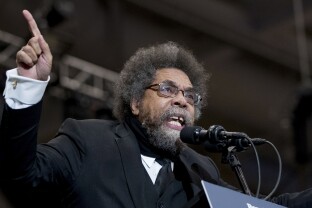Republicans have argued that the presidential contest in North Carolina should be bigger than just Kamala Harris and Donald Trump.
The courts are going in their favor.
In separate court rulings this week, judges cleared the way for both Robert F. Kennedy Jr.’s and Cornel West’s presidential campaigns to appear on the ballot in the state in November.
The North Carolina Democratic Party had challenged Kennedy’s We the People Party, alleging that its setup allowed Kennedy to avoid qualification standards for independent candidates. Creating the alternative We the People Party allowed Kennedy to avoid the 83,000-signature petition threshold to run as an independent candidate and, instead, was only required to collect 13,865. Wake County Superior Court Judge Keith Gregory rejected Democrats’ challenge.
“It would be unconscionable for this court to attempt to tell a candidate who has decided to use one of two methods that the method he used is a subterfuge when in fact — if it is or it isn’t — he still complied with the requirements,” Gregory ruled from the bench, The News & Observer reported.
Meanwhile, the Democratic-majority State Board of Elections also voted recently to not allow West’s Justice for All Party on the ballot after accusations of signature fraud. But U.S. District Judge Terrence Boyle, a Republican appointee, said the board had to recognize West’s party and allow its candidates on the ballot.
The North Carolina Republican Party and the Republican National Committee submitted an amicus brief in support of Kennedy’s party. The state GOP commended the court’s decision in a statement on Monday.
“This is a rebuke of a party that rigged their own primary and then erased the votes of more than 14 million Americans to install the dangerously liberal Kamala Harris as their presidential nominee,” NCGOP Communications Director Matt Mercer wrote.
The RNC intervened in favor of West along with More Voter Choice and the Center for Competitive Democracy, two organizations supporting legal battles for ballot access for third-party and independent candidates. CCD founder Oliver Hall argued the case in court for Justice for All.
“Democrats want these parties off the ballot. Republicans apparently want them on the ballot. They have their own motivations, but in these cases, it so happens that the Republicans are on the right side of the law, they’re on the right side of the Constitution and they’re on the right side of democratic principles,” Hall told NOTUS.
“The idea that the Democratic Party would sue a rival political party because it formed itself as a political party is just astounding,” he said.
Boyle ruled that the elections board did not sufficiently prove that there was fraud in West’s signature-collection efforts. The decision came after a number of voters told election officials that they didn’t recall signing the petition to support West and the Justice for All Party.
“There was ample time to further investigate Justice for All’s petitions to determine their sufficiency,” Boyle wrote. “Instead, the Board conducted one flawed survey and extrapolated its conclusions to the rest of the signatures.”
West and RFK Jr. have been fighting for ballot access for months. Most recently, a New York judge ruled that Kennedy was ineligible to be on the state’s ballot, saying he falsely claimed residency in the state — something that could prompt challenges in other states.
Republicans’ fight to keep both Kennedy and West on the ballot in North Carolina signals the slimming margins in the presidential election and the spoiling power third-party candidates could have. Recent national polling on the general election shows Harris and Trump at a near statistical tie, with some surveys showing Kennedy at 5-6% and West at around 1% of the national vote, respectively.
Some in the state previously told NOTUS that Kennedy’s candidacy could muddy the political waters, though it was unclear in what direction.
Veteran Democratic strategist Gary Pearce says Republicans will ultimately regret propping up Kennedy’s presidential bid.
“I’ve always believed that Kennedy takes more votes from Trump than he does from Harris,” Pearce told NOTUS. “Cornel West could potentially hurt Harris, but RFK attracts the same anti-vaccine and conspiracy voters that Trump does. They pull from the same pool of paranoia, swim in the same swamp.”
—
Calen Razor is a NOTUS reporter and an Allbritton Journalism Institute fellow.
Sign in
Log into your free account with your email. Don’t have one?
Check your email for a one-time code.
We sent a 4-digit code to . Enter the pin to confirm your account.
New code will be available in 1:00
Let’s try this again.
We encountered an error with the passcode sent to . Please reenter your email.


